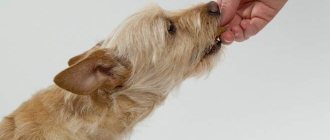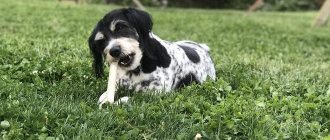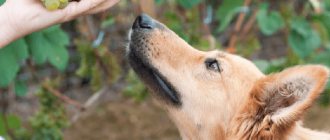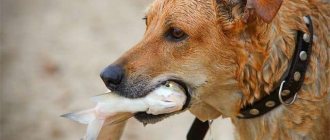Category: Nutrition
You might think that nuts are a harmless and healthy food that can be given to animals in reasonable quantities. However, not everything is so simple. Let's figure out whether dogs can eat nuts and whether they will harm the health of pets.
One day our youngest child spilled a handful of peanuts on the floor. While the one-year-old baby was collecting nuts with his fingers, developing fine motor skills, two helpers came running to his aid: a dog and a cat. Murysia chased funny balls around the apartment, and the miniature schnauzer greedily ate peanuts. That’s how we learned that our picky eater really respects this food product.
On the forums, some dog breeders advocate pampering their pets with them, that nothing bad will happen from a handful of almonds, hazelnuts, or if the dog itself finds a nut under a tree and deals with it. Others warn of danger. But nuts are different.
Possible dangers
Nuts contain a large amount of vegetable fats, and therefore they are very high in calories. Depending on the type, the value can be 500-800 Kcal, which significantly increases the risk of developing pancreatitis. Many types of nuts contain high amounts of iron, which leads to the formation of bladder stones.
Nuts are difficult for the body to digest. Dogs often do not chew them when they eat them, which leads to the accumulation of gases in the intestines. Nuts can also cause poisoning.
Failure to comply with harvesting and storage standards leads to the appearance of mold on the surface of the nuts. Eating them causes inflammation of the gastrointestinal tract. If this is not fatal for a person, then in the case of a dog it is fraught with death for the pet.
Fish and fish products
Yes, dogs can fish. It contains healthy fats and amino acids, giving a good boost of health. Salmon and sardines are especially healthy.
Salmon contains vitamins and protein, and sardines have soft, digestible bones, useful as an additional source of calcium
. With the exception of sardines, be sure to remove all bones from the fish.
Never feed your dog raw or undercooked fish. Only fully cooked and chilled (not hot), and limit your fish intake to no more than twice a week.
Salmon
Can. Fully cooked salmon is an excellent source of protein, healthy fats and amino acids. It improves health, improves brain function and gives the immune system a boost. However, raw or undercooked salmon contains parasites that can cause illness, causing vomiting, diarrhea, dehydration and, in extreme cases, even death. Be sure to cook the salmon at a high temperature to kill any parasites.
Shrimps
Can. A few shrimp every now and then are great for your dog, but only if they are fully cooked and the shell (including the tail, head and legs) is completely removed. Shrimp is a healthy food that is high in antioxidants, vitamin B-12 and phosphorus, and low in fat, calories and carbohydrates.
Tuna
It's possible in moderation. Tuna is a source of Omega-3 fatty acids, which promote heart and eye health. As for canned tuna, it contains small amounts of mercury and sodium, which should be avoided. A little canned tuna and tuna juice, cooked in water, not oil, without spices, can be given to your dog.
What nuts can you give to dogs?
It would be interesting to know which nuts are generally allowed for dogs to eat:
- Cedar. They are relatively easy to digest and safe. This does not mean that the dog can overeat on them. Moderation is important in everything. Sometimes you can pamper your pet, but not every day, of course.
- Almond. It is also on the list of approved foods for dogs. But if you overdo it, problems with the gastrointestinal tract cannot be avoided, and diarrhea is very likely. If almonds are consumed constantly, problems with the pancreas may occur, including pancreatitis (inflammation).
- Chestnut. It can be given to dogs, but not often. Otherwise, problems with the pancreas are also possible. Therefore, chestnut can be given to your pet only occasionally as a treat. If you give the animal a large amount of nut at a time, diarrhea is quite likely.
- Brazilian nut. You can give it, but in very small quantities: no more than one piece per day. Otherwise, you will also have to deal with diarrhea.
- Cashew nuts. This nut is not as fatty as others. Therefore, it can be given more than others. In addition, the nut contains magnesium and calcium. However, you should not feed your pet cashews to compensate for the deficiency of these microelements. For this purpose, vitamins from a veterinary pharmacy or premium food, where all the ingredients necessary for the dog’s nutrition have already been added, are better suited.
- Peanut. In general, this is not a nut, but a legume fruit. Therefore, answering the question whether it is possible to give a dog peanuts, it is worth saying that it is considered the most harmless for the pet among other similar products. Four-legged animals happily eat both peanuts and peanut butter. The latter can be prepared at home. When first used, it is advisable to give a small amount to check if the pet is allergic to the product.
When giving your dog peanuts and other nuts, you should control the amount. If an unexpected reaction of the body or symptoms of poisoning occur, you should immediately seek emergency veterinary help. Self-medication is fraught with dangerous consequences, including death.
Negative consequences
In moderation, nuts are usually not harmful. However, owners should be aware of possible problems and be able to provide first aid.
- Indigestion. Eating atypical food can cause dyspepsia and indigestion. The syndrome is defined as a feeling of pain or discomfort in the abdominal area. Often accompanied by nausea and bloating. At the first alarming symptoms, you can give your pet sorent, but do not delay a visit to the doctor.
- Diarrhea. Nuts are distinguished by a very rich composition of not only vitamins and microelements, but also other substances: juglones (have a slight laxative effect), tannins (relax the intestinal muscles), fiber (stimulates digestion). With excessive consumption of the product, as well as dysfunction of the digestive system, allergies or intolerance to one/several components, the development of intestinal disorders is likely.
- Impaired patency of the gastrointestinal tract. A dog can clog its stomach or intestines with nuts. Clinically, this is manifested by vomiting, unnatural body position, pain in the abdomen, lack of bowel movements, decreased or absent appetite, and increased abdominal volume. Under no circumstances should you force feed an animal or give it water, sorbents, laxatives or antiemetics. In this case, emergency veterinary care is required. Only a doctor can accurately determine the location of the blockage, the severity of the condition and choose the optimal treatment method.
It is better not to give small dogs whole walnuts as a chewing treat.
- Allergic reaction. Nuts are known to be strong allergens. A reaction to them can occur even in dogs that have not previously suffered from allergies and have occasionally enjoyed peanuts. Allergies can manifest themselves in different ways: itching, swelling of the mouth and larynx, urticaria, abdominal pain and nausea.
- Pancreatitis. The pancreas is a unique organ that adapts to a certain diet. If you overload your diet with fatty or unusual foods, the gland has to work to the limit. As a result, the outflow of pancreatic juice is disrupted, and the so-called “self-digestion of pancreatic tissue” develops. This leads to damage, inflammation and irreversible structural changes. Pancreatitis develops. Nuts are a heavy and fatty product. Pancreatitis can be triggered by regularly eating any nuts in uncontrolled quantities.
- Injuries to teeth and oral cavity. Some dogs love to play with walnuts. However, this is fraught with injuries to the mucous membrane, scratches and ulcers of the oral cavity. In addition, it is not difficult to damage a tooth when chewing a walnut peel.
Sometimes you can treat your dog with a few nuts, but this will not bring much benefit. and is it worth risking your pet’s health if there are plenty of other healthier and tastier treats?
More about groundnuts
When wondering whether dogs can eat peanuts, it’s worth taking a closer look at the product.
Peanuts - also called groundnuts - are an important crop in agriculture, cultivated for their fruits (“nuts”). In botany, peanuts are a leguminous herb and not a nut at all. And the name “groundnut” is a tracing-paper from a foreign language.
Overall this is a very useful product. Of course, you should consume it within reasonable limits and only in its raw form. Why can't dogs have roasted peanuts? This question will be answered a little later.
Peanuts are not as fatty as other nuts because they are not a nut at all. It contains nutritional elements: vegetable protein, sodium, potassium, iron, phosphorus, zinc, vitamins A, B, E, K, folic acid, amino acids. Consumption of peanuts has a beneficial effect on the cardiovascular, endocrine system, and liver.
But it is a difficult-to-digest product, so you should not give it to your pet in large quantities. After it, bloating and increased gas formation are possible. If a dog is diagnosed with kidney or liver failure, the answer to the question of whether a dog can eat peanuts will be a resounding negative.
If your pet vomits once, it’s not scary yet
By the way, pets can become ill for various reasons. For example, many cats love to lick powders and antifreeze. According to the pharmacist, if a pet vomits once, it’s not scary. Cats, for example, can ingest fur, and their stomach will react this way.
– But if your pet vomits for the second time in a day, then it is better to consult a doctor. Sometimes they just call and say: the animal has been vomiting for four days, what should I do? You listen and think: what if you were so sick? If you cannot come today, then do not feed the animal before going to the clinic.
For birds, the girl recommends food that contains complete grain components. Birds, by the way, are very picky eaters. Based on his experience, the pharmacist does not recommend buying grain from the market.
As a child, when pet stores were not yet developed, Julia had a budgie. For him, the family bought oats at the market, which were poisoned for parasites during cultivation. The bird ate and died.
– Another mistake is believing in the words of breeders. Some people recommend getting a rabies vaccination when teeth begin to change. Teeth change at 8-9 months, but in our country vaccination is mandatory from three months. And during this period the dog walks unprotected.
Another mistake is to buy different food from the same manufacturer and then make a mixture: from food for wool, strong teeth, etc. If you take food to improve the coat, the result will be at least a month of constant feeding.
What nuts are not allowed?
Not all nuts are good for your dog's health. Here is a list of those that are prohibited:
- Walnuts. Most often they cause poisoning. They can also lead to digestive disorders. Even if the dog is not given walnuts at home, he can find them on the street and eat them along with the shell. And this will cause intestinal obstruction, requiring urgent medical measures. Mold on nut shells causes seizures and other neurological problems in dogs.
- Pistachios. These are very fatty nuts that cause diarrhea in dogs. If they are covered with mold, this may not always be noticeable to the human eye. Most often, pistachios are sold salted. And salt is bad for dogs. Therefore, it is better not to risk it and leave the pistachios for the dog owner and his friends.
- Hazelnut. If you use it frequently, you cannot avoid bladder problems in your dog in the form of stones. The thing is that hazelnuts contain a large amount of iron.
- Macadamia. Rarely found in Russia. Nevertheless, he already has his fans. It is enough for a dog to eat 5-6 pieces to cause convulsions, increased heart rate, and paralysis of the limbs. Scientists have not yet figured out what exactly leads to this reaction, but you should not give this nut to your dog.
- Nutmeg. The same consequences are possible as after macadamia. After consuming it, the animal may fall into a coma and die.
If it gets in the throat
It happens that dogs choke on nuts due to their large size. The nut just gets stuck in the throat and doesn’t go anywhere. Choose small nuts or chop them into small pieces. When a nut gets stuck in your dog's throat, you need to help him cough it up. Follow this instruction:
- Place your fist under your pet's chest;
- Squeeze the animal’s body, directing it forward and upward;
- Do six or seven sets;
- If your pet is unable to cough up food, then take him to the vet immediately.
What are the dangers of peanuts and other nuts for dogs?
Eating any nuts may cause an allergic reaction in the animal. If your dog eats them, you should watch its skin.
Owners often use nuts when training their animals. The nut is thrown in, and the dog catches it on the fly as a treat. This often leads to the dog suffocating if the nut blocks the airway. Therefore, you should not give peanuts and other nuts to your animal during training. It is better to replace them with small pieces of meat.
A dog may find an unshelled nut and swallow it. The shell is quite capable of causing intestinal obstruction or even puncture.
The mold that forms on nuts during long-term storage is not visible to humans in small quantities. And its action leads to disturbances in the functioning of the liver and heart.
High calorie content. The energy value of peanuts is 548 kcal per 100 grams, and roasted ones are even higher. By consuming it daily, your pet can easily become obese. If the owner is wondering whether dogs can have roasted peanuts, you should know that veterinarians categorically prohibit giving this product to pets, considering it very harmful. It may not be absorbed in the pet’s body and lead to adverse consequences.
Due to their high fat content, peanuts and other nuts cause pancreatitis, an inflammation of the pancreas.
Contraindications
Owners of miniature dogs often wonder whether Pomeranians and other babies can eat nuts. There are cases when fruits are completely contraindicated for consumption:
- It is prohibited to feed pets during illness, during the recovery period, or after surgery. Excessive stress on the immune system will cause a backlash, the animal will begin to get sick and become defenseless against secondary infections.
- They should not be fed to four-legged animals with food allergies. Such individuals are encouraged during walks and during training with crackers or a specialized hypoallergenic dog treat.
- It is highly undesirable to give kernels to elderly pets or pregnant females. Their bodies are not able to fight toxins and fats; as a result of violating the ban, animals may develop urolithiasis or an inflammatory process in the pancreas.
Why bans in most cases apply to puppies: only certain types can be given to babies. These include cashews, peanuts and pine nuts. A young body copes poorly with protective functions, and the components that make up the core can negatively affect the gastric mucosa.
Important! Can Chihuahua puppies eat nuts: they are added to the diet extremely rarely, the total dosage is reduced by three times - compared to mature individuals.
Dog handlers advise completely excluding the product from the menu of young animals under twelve months of age.
Signs of food allergies
When should you not give your dog nuts?
There may be periods in the life of any pet when eating nuts is undesirable:
- If the puppy is very small, you should not give him peanuts and other nuts. You can give a little bit to an older pet.
- Pregnant women should not eat nuts because they are difficult for the body to digest.
- A nursing mother can be given no more than a few kernels to enhance lactation. In addition to peanuts, pine or cashews are also suitable.
- If your dog is prone to allergic reactions or has kidney or gastrointestinal diseases, he should not eat nuts.
Who are they contraindicated for?
Puppies
They are the ones who primarily fall into this category. Not all nuts are contraindicated for puppies. So it is permissible to give:
- cedar;
- cashew nuts;
- peanut.
Puppies have a very weak body, and nuts can have a negative effect on their stomach, so if you feed a puppy with them, then very rarely, reducing the norm of an adult dog by almost two to three times . This product is contraindicated for very young puppies (less than a year old).
Pregnant and nursing
It is forbidden to give nuts to pregnant dogs. Nursing dogs are allowed to eat 3-4 pieces to enhance lactation. It is better, of course, to give the same nuts as puppies: this way you can reduce the risk of illness for the dog and its offspring.
Nuts pose a great danger to small dogs such as pugs, spitzes, and chihuahuas. This product is also contraindicated in dogs with kidney and gallbladder problems. And of course, they are prohibited for dogs if they are allergic to them.
How about peanut butter?
Can dogs eat peanuts? It’s clear. But sometimes owners give their dogs paste or oil as a treat. In this case, it is very important to read the composition of the product on the packaging. Often, such gastronomic products contain xylitol, a sugar substitute. It is a highly toxic ingredient for dogs. Manufacturers often replace its presence in the product with the words “natural sweetener” or “sugar alcohol.”
Xylitol, even in small amounts, can cause hypoglycemia in a dog - a drop in blood sugar. This component also destroys the pet’s liver.
Peanut butter without xylitol can be offered to your pet in limited quantities - no more than a teaspoon per day.
They are high in calories and can lead to weight gain
For dogs that are overweight or prone to weight gain, nuts should be avoided.
For example, if you give your dog a small amount of peanut butter to take pills, you should not allow the calories provided by all combination treats (including peanut butter) to exceed 10% of their total daily calories. This helps prevent treats from throwing your dog's diet out of balance.
This table shows the approximate calorie content (kcal/100g)* of different types of edible nuts without shell:
| Nut type | Calorie content (kcal * / 100 g) |
| Blanched almonds | 590 |
| Almonds, dry roasted, unsalted | 598 |
| Cashews, dry roasted, unsalted | 574 |
| Cashews, raw | 553 |
| Peanuts, roasted unsalted | 587 |
| Peanuts, raw | 567 |
| Pecans, dry roasted, unsalted | 710 |
| Pecans, raw | 691 |
| Pistachios, roasted, unsalted | 572 |
| Raw pistachios | 560 |
| Walnuts, English raw | 654 |
Content
1. Can dogs eat nuts? – Considering useful tips 2. Recommended nuts 3. Types of nuts 4. Which nuts are completely prohibited?
Often people literally “stuff” their pets with a variety of foods, without even thinking about the benefits. The reasoning goes something like this: “if it’s good for me, then why should it be the other way around for my beloved dog?” And without even specifying whether dogs can have nuts, some fruits or vegetables, without even consulting a veterinarian, they simply add them to the diet. And thus cause irreparable harm to animals.
If you read various forums and chats of dog breeders, you can come across completely opposite points of view. Some breeders claim that nuts are very beneficial for dogs, especially puppies with rapidly growing bodies. Others, on the contrary, argue that this food product literally kills pets. In their own way, both sides are right, they just don’t specify what specific species they are talking about? Let's try to understand this issue too.











